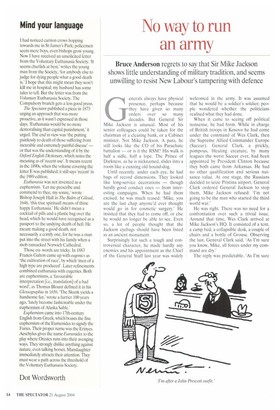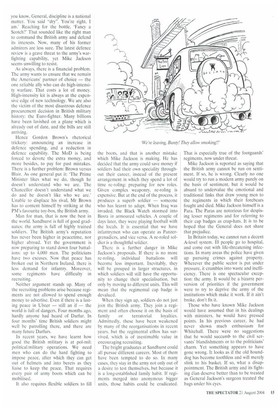\o way to run an army
Bruce Anderson regrets to say that Sir Mike Jackson shows little understanding of military tradition, and seems unwilling to resist New Labour's tampering with defence
Generals always have physical presence, perhaps because they have given so many orders over so many decades. But General Sir Mike Jackson is unusual. Most of his senior colleagues could be taken for the chairman of a clearing bank, or a Cabinet minister. Not Mike Jackson. A para, he still looks like the CO of his Parachute battalion — or is it the RSM? His walk is half a sidle, half a lope. The Prince of Darkness, as he is nicknamed, slides into a room like a cunning old hound-dog.
Until recently. under each eye, he had bags of record dimensions. They looked like long-service decorations — though hardly good conduct ones — from interesting campaigns. When he had them excised, he was much teased: 'Mike, you are the last chap anyone'd ever thought would go in for cosmetic surgery.' He insisted that they had to come off, or else he would no longer be able to see. Even so, a lot of people thought that the Jackson eyebags should have been listed as an ancient monument.
Surprisingly for such a tough and controversial character, he made hardly any enemies and his appointment as the Chief of the General Staff last year was widely welcomed in the army. It was assumed that he would be a soldier's soldier; people wondered whether the politicians realised what they had done.
When it came to seeing off political nonsense, he had form. While in charge of British troops in Kosovo he had come under the command of Wes Clark, then the Supreme Allied Commander Europe (Saceur). General Clark, a prickly, pompous, bleating creature, by many leagues the worst Saceur ever, had been appointed by President Clinton because they both came from Arkansas. He had no other qualification and serious nuisance value. At one stage, the Russians decided to seize Pristina airport. General Clark ordered General Jackson to stop them. Mike Jackson refused: 'I'm not going to be the man who started the third world war.'
He was right. There was no need for a confrontation over such a trivial issue. Around that time, Wes Clark arrived at Mike Jackson's HQ. It consisted of a tent, a camp bed, a collapsible desk, a couple of chairs and a bottle of Grouse. Observing the last, General Clark said, 'As I'm sure you know, Mike, all forces under my command are dry.'
The reply was predictable. 'As I'm sure you know. General, discipline is a national matter. You said "dry". You're right, I am.' Reaching for the bottle, 'Fancy a Scotch?' That sounded like the right man to command the British army and defend its interests. Now, many of his former admirers are less sure. The latest defence review is a grave threat to the army's warfighting capability, yet Mike Jackson seems unwilling to resist.
As always, there is a financial problem. The army wants to ensure that we remain the Americans' partner of choice — the one reliable ally who can do high-intensity warfare. That costs a lot of money. High-intensity kit is always at the expensive edge of new technology. We are also the victim of the most disastrous defence procurement decision in British military history: the Euro-fighter. Many billions have been lavished on a plane which is already out of date, and the bills are still arriving.
Hence Gordon Brown's rhetorical trickery: announcing an increase in defence spending, and a reduction in defence capability. The MoD is being forced to devote the extra money, and more besides, to pay for past mistakes. There is a further problem: Brown versus Blair. As one general put it: The Prime Minister likes what we do, though he doesn't understand who we are. The Chancellor doesn't understand what we do and he doesn't like who we are.' Unable to displace his rival, Mr Brown has to content himself by striking at the PM's favourite toy-box, the British army.
Man for man, that is now the best in the world. Sandhurst is full of good graduates; the army is full of highly trained soldiers. The British army's reputation has never been higher in peacetime, nor higher abroad. Yet the government is now preparing to stand down four battalions: up to 4,000 men. The politicians have two excuses. Now that peace has broken out in Northern Ireland, there is less demand for infantry. Moreover, some regiments have difficulty in recruiting.
Neither argument stands up. Many of the recruiting problems arise because regiments are not allowed to spend enough money to advertise. Even if there is a lasting peace in Ulster — still an if — the world is full of dangers. Four months ago, hardly anyone had heard of Darfur. In four months' time British soldiers might well be patrolling there, and there are many future Darfurs.
In recent years, we have learnt how good the British military is at pol-mil: political/military operations. We need men who can do the hard fighting to impose peace, after which they can get out of helmets and into berets as they liaise to keep the peace. That requires every pair of army boots which can be mobilised.
It also requires flexible soldiers to fill the boots, and that is another mistake which Mike Jackson is making. He has decided that the army could save money if soldiers had their own speciality throughout their career, instead of the present arrangement in which they spend a lot of time re-roling: preparing for new roles. Given complex weaponry, re-roling is expensive. But at the end of the process, it produces a superb soldier — someone who has learnt to adapt. When Iraq was invaded, the Black Watch stormed into Basra in armoured vehicles. A couple of days later, they were playing football with the locals. It is essential that we have infantrymen who can operate as Panzergrenadiers, and vice versa. A re-roled soldier is a thoughtful soldier.
There is a further danger in Mike Jackson's proposals. If there is no more re-ruling, individual battalions will become less important. Inevitably, they will be grouped in larger structures, in which soldiers will still have the opportunity to change their specialisation, but only by moving to different units. This will mean that the regimental cap badge is devalued.
When they sign up, soldiers do not just join the British army. They join a regiment and often choose it on the basis of family or terratorial loyalties. Admittedly, these have been weakened by many of the reorganisations in recent years, but the regimental ethos has survived, which is of inestimable value in encouraging recruiting.
The bright graduates at Sandhurst could all pursue different careers. Most of them have been tempted to do so. In many cases, they stay in the army not only out of a desire to test themselves, but because it is a long-established family habit. If regiments merged into anonymous bigger units, those habits could be eradicated. That is especially true of the footguards' regiments, now under threat.
Mike Jackson is reported as saying that the British army cannot be run on sentiment. If so, he is wrong. Clearly no one would try to run a modern army purely on the basis of sentiment, but it would be absurd to undervalue the emotional and traditional links that draw young men to the regiments in which their forebears fought and died. Mike Jackson himself is a Para. The Paras are notorious for despising lesser regiments and for referring to their cap badges as crap-hats. It is to be hoped that the General does not share that prejudice.
In Britain today, we cannot run a decent A-level system. Ill people go to hospital, and come out with life-threatening infections. In many areas the police have given up pursuing crimes against property. Wherever the public sector is put under pressure, it crumbles into waste and inefficiency. There is one spectacular exception: the army. It would be a bizarre perversion of priorities if the government were to try to deprive the army of the institutions which make it work. If it ain't broke, don't fix it.
Those who have known Mike Jackson would have assumed that in his dealings with ministers, he would have pressed points. In his previous career, he had never shown much enthusiasm for Whitehall. There were no suggestions that he would succumb to the civil servants' blandishments or to the politicians' charm. Yet something appears to have gone wrong. It looks as if the old hounddog has become toothless and will merely slink to his basket. If so, what a disappointment. The British army and its fighting élan deserve better than to be treated as General Jackson's surgeon treated the bags under his eyes.



























































 Previous page
Previous page